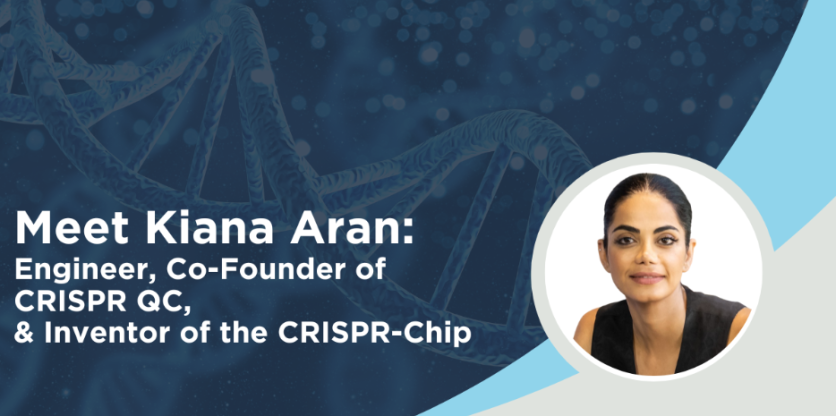
Kiana Aran is leading innovation at the intersection of semiconductors and CRISPR technology. As an engineer, inventor, professor, and serial entrepreneur, she is extremely successful, but she has zero plans on slowing down.
Since earning her post-doctorate degree, Aran has used her profound curiosity, diverse STEM background, and adventurous spirit to found three companies. "The first one, I failed, but the technology survived and was licensed and in pre-clinical trials. The second one, we went through a merger-acquisition two times. And now, CRISPR QC is my third one, but won't be my last."
Currently, with her vast expertise, she is helping CRISPR QC propel the gene editing market forward. The company provides quality control for reagent formulations, environmental elements, and other factors used in genetic research and therapy for both clinical and agricultural applications. CRISPR QC helps researchers select the most optimal reagents and conditions for editing. By monitoring components such as Cas proteins and guiding RNA activity in real-time, CRISPR QC enables biotech companies to maintain the integrity of their formulations, ensuring the success and timeliness of genetic editing experiments and therapies.
As a co-founder of CRISPR QC, Dr. Aran continually plays a pivotal role in driving the company's mission as chair of the Scientific Advisory board. She also drives strategic decision-making and product development guided by her expertise in semiconductors. While Aran has had admirable success with CRISPR QC and loves what she does, the path wasn't always linear. "I did my undergrad in electrical engineering. I disliked it. And I could not wait to get out of it because it was such a dry, boring field for me. However, during my postdoc, I started combining biology and electronics. I went into biomedical engineering. Things got more interesting as I began to see the impact of my work. And I realized that my background in electrical engineering was essential because it gave me a new perspective on how I looked at things. It allowed me to bring about this innovation because I was looking at problems from a different angle."
Engineer, Inventor, Scientist, and More
By seeing problems from the lens of an engineer, Aran can approach them with an unconventional perspective—this has led to innovative solutions with profound impact. "I have never intentionally planned any of my inventions; they simply arise as answers to my curiosity. Several of them have evolved into commercial products." Aran explains one such instance, "One day in Berkeley, at a coffee shop, I was contemplating CRISPR technology and its potential, and I realized its significance. At that time, there were a number of exciting conversations at Berkeley surrounding Jennifer Doudna and her discovery of CRISPR-Cas9, which resulted in my curiosity."
She explains, "I was working with transistors to make different diagnostic tests. And then I remember, while sipping my coffee at the coffee shop, I was thinking, 'This CRISPR enzyme is really interesting. It can unzip the double-stranded DNA. It can search for the target sequence, it can cut it, and then people can do editing. However, the major function of this enzyme is searching. What if I could just monitor the enzyme activity because then I would see if the enzyme actually binds to the DNA or finds its target or it doesn't.'"
It took Aran almost two years to complete all the preliminary and clinical studies on sickle cell disease and Duchenne muscular dystrophy. "We developed a genotyping tool using CRISPR on our sensors, initially aiming to commercialize it as a 'Google your genome' product."
Upon engaging with partners, the team quickly recognized the broader potential of the technology, and by incorporating real-time monitoring into their sensor processes, they discovered significant value for stakeholders. "That is how CRISPR QC was born, by talking with different people, understanding the need in the market and realizing that the value or the best product for our technology was actually quality, controlling the reagent and making sure that you have the formulation intact and you can monitor their efficacy before you even start your gene editing process in cells. And we're continuing to grow the platform, and we are answering many more questions that are critical for the genome editing field. Addressing these questions is critical in making genome editing tools scalable and equitable."
In addition to the critical work Aran is doing with CRISPR QC, she is also a professor at the University of California in San Diego. She loves teaching and mentoring students and advocating for women in STEM. "Encouraging more women in engineering is important." In 2021, Aran won the Nature Research Award for inspiring women in science. With funding from that award, she has been able to help support women interested in science, technology, and especially engineering in bioscience. "Different experiences and viewpoints that men and women bring are paramount for driving innovation and success in scientific endeavors."
Aran's career so far highlights the transformative power of unique perspectives. She was recently elected to the National Academy of Inventors as a senior member for her innovations. Her contributions to semiconductor innovation in the biosciences are profound, and combined with her entrepreneurial spirit, CRISPR QC is set to propel genetic research and therapy.
Find out more about the important work Aran is doing at CRISPR QC.
ⓒ 2025 TECHTIMES.com All rights reserved. Do not reproduce without permission.





